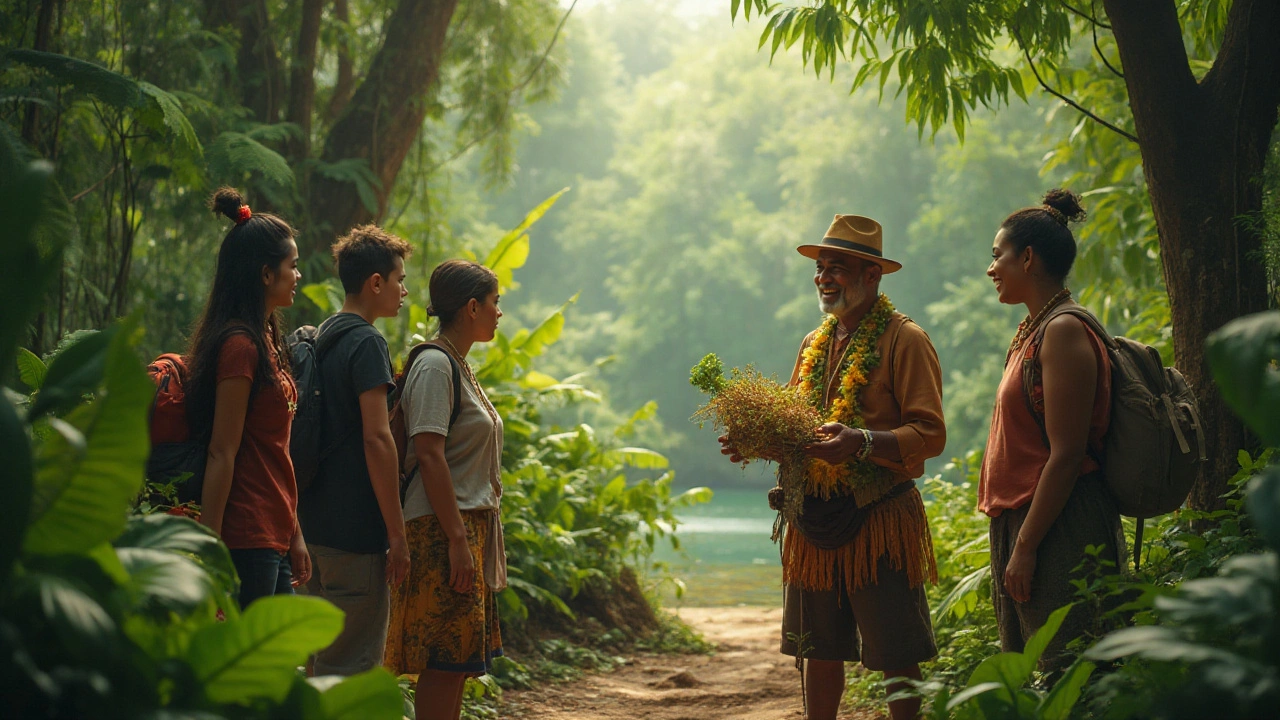- Home
- Medical Tourism
- Understanding Health Challenges in Costa Rica for Medical Tourists

Understanding Health Challenges in Costa Rica for Medical Tourists
Visiting Costa Rica for healthcare services is increasingly popular, but understanding the local health landscape can be crucial for a successful medical journey. Nestled in Central America, this tropical paradise boasts a diverse ecosystem and a commitment to public health. However, like every other country, Costa Rica faces its own set of health challenges.
For those contemplating medical tourism, being aware of prevalent health issues may aid in planning and preparation. While the nation is celebrated for its advanced healthcare facilities, emerging health conditions can pose challenges if ignored. From the tropical climate's influence on health to infrastructure-related issues, knowing what to anticipate ensures a safer and more informed trip.
- Current Health Landscape in Costa Rica
- Leading Health Issues
- The Impact on Medical Tourism
- Preventative Measures for Tourists
- Healthcare Resources and Support
Current Health Landscape in Costa Rica
Costa Rica is often lauded for its impressive healthcare system, which is considered one of the best in Latin America. The country has made significant investments in public health, resulting in remarkable life expectancy rates and a healthcare system that provides coverage for nearly all of its citizens. A mix of tropical climate and diverse geography poses unique challenges, influencing the nation's ongoing health dynamics. The government has pledged to prioritized healthcare, with family clinics and hospitals prevalent even in the remotest parts. However, the changing climate and urbanization have introduced some complexities to what has historically been a robust system.
Non-communicable diseases, such as heart disease and diabetes, are among the leading health challenges. This rise is largely related to lifestyle changes, including dietary shifts and reduced physical activity. Urbanization has altered the way people live, with more sedentary jobs and an inclination towards fast food, contributing to the increased risk of such diseases. Infectious diseases remain a concern, too, with dengue fever and other mosquito-borne illnesses most prevalent during the rainy season. The government and public health bodies strive for vigilant control and community awareness to mitigate these risks.
An interesting dimension of Costa Rica's health landscape is its focus on mental health care. Recognizing the importance of psychological well-being, Costa Rica has integrated mental health services into its primary care offerings. National initiatives now include measures to address stress and improve mental health literacy among its people. Costa Rica's commitment to health education shines through in their public health campaigns seen across media platforms, aimed at educating citizens about lifestyle diseases and other issues.
A considerable contributor to Costa Rica’s health profile is its focus on preventative care. Educational programs fostered by public and private sectors aim at minimizing health issues before they arise. Programs are tailored to different age groups and health topics, ensuring that even the most vulnerable populations are informed. Vaccination programs, free and widely accessible, are effectively administered throughout the country. Costa Rica's approach to nurturing a well-informed public has been instrumental in addressing health problems before they become critical.
According to the World Health Organization, Costa Rica allocates over 9% of its GDP to health expenditure, a testament to its commitment towards health and wellbeing. This emphasis is evident in its ranking as a top destination for medical tourism, drawing thousands every year seeking affordable yet high-quality healthcare. The focus on making health services accessible and efficient for both locals and visitors remains a pivotal aspect of their national policy.
"Costa Rica's proactive health culture is distinctive, driven by a societal focus on community wellness and innovative health policy execution," states Dr. Maria Gonzales, a leading expert from the University of Costa Rica.
Nonetheless, there are areas sufficiently in need of development. Accessibility to specialized healthcare—a critical issue in remote areas—necessitates improvement. While telemedicine offers a partial solution, expanding access and reducing wait times for specialized treatments remain a priority. Continuous efforts to reinforce these areas are essential in maintaining Costa Rica's healthcare edge amid global health challenges.
Leading Health Issues
Costa Rica, known for its lush rainforests and vibrant biodiversity, also faces several health challenges that are important to acknowledge, particularly for those eyeing medical tourism. Understanding these issues helps in appreciating both the strength and the efforts required to enhance the healthcare experience. The country enjoys a health system reputed for its universality and accessibility. Despite that, as with many tropical nations, Costa Rica struggles with diseases such as dengue fever, chikungunya, and Zika virus, which are common due to its climate. These mosquito-borne illnesses thrive in the humid, rainy seasons, necessitating ongoing public health campaigns and tourist awareness.
Non-communicable diseases (NCDs) such as diabetes and cardiovascular conditions are prevalent within the country as well. The changing lifestyle, marked by urbanization and dietary shifts, has ushered in health issues that were less common in previous decades. For instance, a study noted that nearly a quarter of the adult population in Costa Rica is affected by high blood pressure. This statistic resonates with the global increase in NCDs, linking it to lifestyle choices and genetic predispositions. Efforts to combat these challenges include national campaigns promoting healthier diets and physical activity.
Another key issue is access to mental health care. Even within the robust health care framework, mental health often does not get the attention it warrants. Challenges such as depression and anxiety have become more visible, urging healthcare providers to integrate mental wellness into overall health strategies.
"Mental health must be prioritized as much as physical well-being to truly serve the citizens," a statement echoed by Dr. María Vargas, a renowned public health advocate at a recent international health summit.Addressing mental health is crucial for holistic care, not only for locals but also for visitors seeking a comprehensive healthcare experience.
Environmental factors also cast a shadow on Costa Rican health scenarios. Air quality, especially in urban areas like San José, poses respiratory health risks. The bustling influx of vehicles and ongoing development projects contribute significantly to air pollution, requiring governmental intervention to mitigate long-term impacts. Visitors with pre-existing respiratory conditions must take precautions, especially if planning to stay in busy urban centers.
Efforts to improve the situation are underway across various fronts. The government collaborates with international health organizations to put proactive measures in place. Addressing health needs, they are also tapping into technological advancements to forge advances in diagnosing and managing these challenges. For medical tourists, staying informed about these health issues enhances decision-making, ensuring that their health choices are sound and conducive to recovery.

The Impact on Medical Tourism
Costa Rica's flourishing reputation as a top-notch destination for medical treatments is often echoed by those who have welcomed its burgeoning healthcare sector. With the number of people traveling to take advantage of Costa Rica's affordable and high-quality medical services rising steadily, it becomes crucial to assess how local health challenges could influence their experiences. Many tourists are drawn by procedures that range from dental work to cosmetic surgery. Nonetheless, the underlying concerns prevalent in the region can still affect their overall healthcare journey, necessitating a cautious approach.
A major health issue in Costa Rica that warrants attention is the prevalence of mosquito-borne diseases such as dengue fever and the Zika virus. These conditions, exacerbated by the country's tropical climate, pose risks not only to locals but also to the incoming medical tourists. An awareness of such health threats is imperative for visitors coming for medical care. The Costa Rican government has made significant strides in disease control, but occasional outbreaks still occur, reminding travelers to adhere to established health guidelines. Clearly, knowledge about potential health hazards is vital for any medical tourist planning their stay.
Moreover, the promise of affordable healthcare should never overshadow the necessity of understanding local health dynamics. Interestingly, Costa Rica offers not just a savings of up to 50% to 70% on healthcare costs compared to North America, but also an opportunity for patients to recuperate in tranquil settings during their recovery periods. However, these benefits must be balanced against the healthcare landscape, potentially characterized by periodic shortages of specialized professionals or equipment due to higher local demand. Visitors must research and select accredited health facilities with a solid track record of catering to international patients.
Another factor influencing medical tourism is the nation's efficient healthcare system, often ranked higher than that of many developed countries. The Costa Rican Caja Costarricense de Seguro Social (CCSS), or Social Security System, ensures that healthcare is accessible to almost all citizens. Despite its strengths, longer waiting periods for certain treatments can arise, necessitating alternative arrangements by international patients if fixed timelines are crucial.
According to Dr. John Doe from the Global Health Organization, "While Costa Rica remains a haven for medical tourists, staying informed and prepared regarding local health trends can effectively enhance their treatment experiences." This wisdom emphasizes the need for well-informed, cautious engagement with the environment while enjoying its world-class medical offerings.
In conclusion, potential medical tourists should be proactive about understanding and mitigating the health challenges they may face in Costa Rica. This requires ample research, planning, and collaboration with healthcare providers to ensure that their medical journey not only meets their treatment needs but also offers a personally rewarding experience. Seamlessly blending healthcare needs with vacation elements requires attentiveness to both health risks and available resources, thereby maximizing comfort and outcomes.
Preventative Measures for Tourists
Traveling to Costa Rica with medical goals in mind is an exciting venture. Yet, preparing for your health ahead of a trip is as essential as choosing the right procedure. The country's tropical climate brings about the need for specific health precautions, particularly concerning mosquito-borne illnesses like dengue fever and Zika virus. Tourists are advised to bring along mosquito repellent and wear long-sleeved clothing to guard against bites. The right timing of your visit could also help minimize risks; the dry season from December to April sees fewer mosquitos.
Equally important is understanding Costa Rica’s healthcare system. The country is known for its excellent healthcare, with some facilities even accredited by international standards. However, having comprehensive travel insurance that covers medical expenses is indispensable. This can protect you from unforeseen financial burdens should you require emergency medical attention. Costa Rica’s public and private hospitals are well equipped, but costs can accumulate quickly for uninsured tourists.
Staying healthy also involves dietary precautions. While Costa Rican cuisine is delightful, foreigners might face gastrointestinal issues due to unfamiliar food. It is wise to stick to bottled water and well-cooked meals, especially if you have a sensitive stomach. Remember to wash fruits and vegetables thoroughly, or better yet, opt for cooked versions to avoid any surprises that could derail your health plans.
The bustling cities and serene countryside both offer unique experiences. But traversing through them requires certain caution. Roads in rural areas may pose unexpected hurdles; hiring reputable transportation services ensures safety. Moreover, the ongoing threat of COVID-19 means maintaining hygiene practices like regular handwashing and using sanitizers is necessary, regardless of vaccinations.
An aspect often underestimated is the importance of language. While Costa Rican healthcare providers often speak English, brushing up on basic Spanish can enhance interactions and ensure clearer communication regarding your medical needs. According to Dr. González, a leading physician in San José,
"Understanding the local language can significantly ease a patient’s anxiety and clarify treatment processes."This tip becomes particularly useful in emergencies, rounding out a holistic approach to a worry-free medical visit.

Healthcare Resources and Support
Costa Rica is well-regarded for its robust healthcare system, which is significant in the realm of medical tourism. The country's healthcare framework is divided into public and private sectors, both offering high-quality services that often attract international patients. The public sector is managed mainly by the Costa Rican Social Security System, known as Caja, ensuring affordable healthcare for its citizens. On the other hand, private healthcare options provide shorter wait times, English-speaking staff, and access to the latest medical technology, making them appealing to tourists.
One of the strengths of Costa Rica’s healthcare is its network of private hospitals and clinics that cater specifically to international patients. These facilities often boast international accreditations, such as certifications from Joint Commission International, underscoring their commitment to quality and safety. As a medical tourist, it's essential to verify these accreditations to ensure you're receiving top-tier care. Private hospitals like CIMA Hospital in San Jose are renowned for their comprehensive services ranging from cosmetic surgery to more intricate procedures like cardiovascular interventions.
"Costa Rica's strategy not only involves maintaining high health standards but also ensuring that there's a synergy between eco-tourism and wellness tourism," says Dr. Juan Carlos Martinez, a healthcare policy expert.Access to quality healthcare in Costa Rica also extends to pharmacies, which are numerous and well-stocked across the country. Many medications that require prescriptions in other countries might be available over the counter in Costa Rica, which can be a relief for travelers needing quick solutions to minor health issues.
For those considering a stay in Costa Rica for their medical treatment, understanding insurance options is pivotal. International health insurance plans are often accepted, but checking in advance is wise to prevent any unforeseen expenses. The cost-effectiveness of treatments in Costa Rica, when compared globally, remains one of the critical attractions for medical tourism; services can cost between 40% to 70% less than similar services in the United States. This affordability, combined with skilled healthcare professionals, reinforces Costa Rica's position as a leading destination for medical tourism.
Costa Rica's government has also been proactive in promoting medical tourism by investing in infrastructure improvements and ensuring seamless connectivity for international patients. Initiatives like the Medical Tourism Congress are examples of the nation’s dedication to fostering this sector. Therefore, Costa Rica offers not just treatment, but an entire healthcare experience tailored to international standards, ensuring peace of mind for patients who choose to make the journey.

Arnav Singh
I am a health expert with a focus on medicine-related topics in India. My work involves researching and writing articles that aim to inform and educate readers about health and wellness practices. I enjoy exploring the intersections of traditional and modern medicine and how they impact healthcare in the Indian context. Writing for various health magazines and platforms allows me to share my insights with a wider audience.
About
Medical Resource Center India is a comprehensive online platform dedicated to providing reliable health information and medical resources in India. Explore a wide range of articles, tips, and advice on medicine, healthcare services, and wellness. Stay informed about the latest developments in Indian medicine and access valuable insights into maintaining a healthy lifestyle. Discover expert guidance and health solutions tailored for every Indian citizen. Your go-to destination for authoritative medical knowledge in India.








